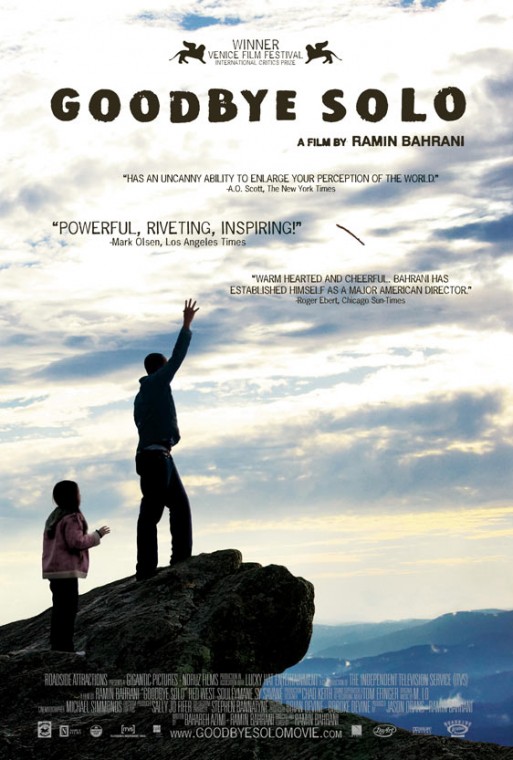 We never know very much about the two principal characters in Goodbye Solo, a 2009 film by Ramin Bahrani. We learn more about them in the five-minute opening sequence than we do in the film’s remaining 85. A charming and fast-talking Senegalese cab driver named Solo picks up an old, weathered Southern man named William who wears bags under his eyes so deep they threaten to take over his entire face. The old man asks the driver to pick him up in two weeks time, and, for $1,000, to drive him to a remote location called Blowing Rock National Park, a towering mountain peak in the Appalachians, and leave him there. “Why you want to go there?” Solo asks him instantly, “You going to jump?” The old man doesn’t answer. The worry and bafflement you see in Solo then seems completely honest: “Why you want to do that, man?… Tomorrow’s going to be a better day.” But again, William doesn’t respond. You see and instantly understand that this grates on the cab driver. It is testament to the strength of the director, the writer, and the actors, that Solo’s decision now to befriend the troubled old man and convince him to do otherwise, comes as no surprise.
We never know very much about the two principal characters in Goodbye Solo, a 2009 film by Ramin Bahrani. We learn more about them in the five-minute opening sequence than we do in the film’s remaining 85. A charming and fast-talking Senegalese cab driver named Solo picks up an old, weathered Southern man named William who wears bags under his eyes so deep they threaten to take over his entire face. The old man asks the driver to pick him up in two weeks time, and, for $1,000, to drive him to a remote location called Blowing Rock National Park, a towering mountain peak in the Appalachians, and leave him there. “Why you want to go there?” Solo asks him instantly, “You going to jump?” The old man doesn’t answer. The worry and bafflement you see in Solo then seems completely honest: “Why you want to do that, man?… Tomorrow’s going to be a better day.” But again, William doesn’t respond. You see and instantly understand that this grates on the cab driver. It is testament to the strength of the director, the writer, and the actors, that Solo’s decision now to befriend the troubled old man and convince him to do otherwise, comes as no surprise.
Director Ramin Bahrani is a relative newcomer. Goodbye Solo is only his third movie, but he’s quickly earning a reputation as an important American filmmaker. He tends to focus on the disenfranchised and the outsiders — his last film, Chop Shop, which is on Roger Ebert’s list of Great Movies, deals with street kids in New York City who survive by their wits and the money they can make stealing small items and peddling street goods. His first movie, Man Pushcart, was about a struggling Pakistani food vendor in Manhattan. Goodbye Solo is about a more personal kind of isolation. Both William and Solo are grappling with a lack of meaning in their life — the difference is while William has already given up finding any, Solo is full of the hopeful promise that there is more to come, which is why William’s decision disconcerts him so much.
We never know exactly why William feels so hopeless. Solo asks many times, but he never gets an answer. Roger Ebert draws an interesting parallel between William’s character and the life of the actor who portrayed him, Red West. A lifelong friend of Elvis Presley, West was one of the only people in the legendary musician’s close circle that The King could fully trust when he was beginning his precipitous slide into drugs and self-destruction. West played a role similar to the one Solo plays for William, doing what very little he could to reverse the downward course of a life that isn’t his own. One wonders if this informed West’s portrayal of William in any way, whose constant brooding obstinacy only periodically seems capable of breaking, though when it does the moments are surprisingly uplifting.
The final scene of the film, in which Solo insists that he take his young stepdaughter Alex along on William’s drive to Blowing Rock, is powerful in its quiet inevitability. Alex might not understand what is happening right then. But maybe one day she will, and maybe, like Solo, she will realize that it was important that she was there to witness it.

 Goodbye Solo, by Ramin Bahrani
Goodbye Solo, by Ramin Bahrani



 Trans Remembrance Project Provides a Community of Grieving
Trans Remembrance Project Provides a Community of Grieving
 Caring for a Dying Loved One? Be Gentle With Yourself.
Caring for a Dying Loved One? Be Gentle With Yourself.














